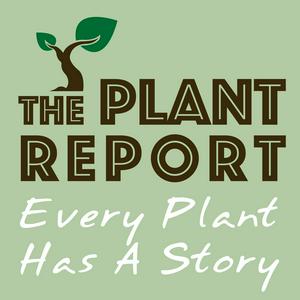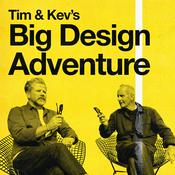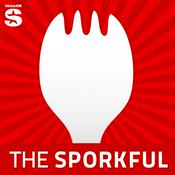38 episodes

The Fabulous Fig
16/5/2023 | 54 mins.
Episode 38: Our plant today is Fig and our guest is Dr. Lee Reich. Lee is a writer, horticultural consultant, and educator with graduate degrees in soil science and horticulture. Lee is a big fan of Figs (Ficus carica) and in this episode we learn how to successfully propagate, grow, and harvest this ancient plant. Lee explains why it's a challenge to know how many varieties of Figs there really are and shares his tips about how to keep your Fig trees healthy and happy. Figs are unique in the fruit world. Did you know that when you eat a Fig, you aren't eating a fruit? A fig is really a syconium (or synconium), a part of a stem that expands into a sac containing flowers. Luckily for us, Fig syconiums are so delicious! Although, Figs are a true Mediterranean plant, they are adaptable and resilient. Those who live in colder climates, rejoice! You can successfully grow Figs and enjoy your own delicious syconiums. :) Lee shares some of his many methods for Fig growing in cold regions, including growing them in pots, overwintering them in greenhouses and basements, and pruning them so their low growing arms are very close to the ground. Learn more about these techniques in depth in Lee's book Growing Figs in Cold Climates. A former plant and soil researcher for the U.S. Department of Agriculture and Cornell University, Lee's books include Weedless Gardening, Uncommon Fruits for Every Garden, and Growing Figs in Cold Climates. Lee wrote a syndicated gardening column for the Associated Press for nearly 30 years. Lee's farmden- his term for his more than a garden, less than a farm, piece of land, has been featured in many publications like the New York Times and Martha Stewart Living and has won awards from National Gardening and Organic Gardening magazines. Visit Lee's website at leereich.com to learn about Figs, fruit, gardening, soil, and more! Lee was a guest on my other podcast Sustainable World Radio. Click here to listen to the episode Gardening Like Nature, where Lee discusses the art and science of building soil from the ground up and why he believes it's important to pay attention to the top few inches of soil and let nature take care of the rest. Learn about mulch, the importance of compost, and why Lee loves to repurpose what others might call waste in his quest to improve soil fertility and grow vibrant and resilient plants.

The Wild World of Hops
04/12/2021 | 55 mins.
Welcome to the world of Hops, Humulus lupulus. In this relaxed conversation with organic farmer and Hops grower Acadia Tucker, we discuss this unwieldy and happy to be alive plant. We touch briefly on the history of Hops, which like its illustrious relative Cannabis, was once feared as a "wicked weed." Now revered for its distinctive bitter flavor and potency as a nerve tonic, Hops is grown worldwide. Acadia talks about the difference between a bine and a vine, how to propagate Hops, and why the European Corn Borer is such a tenacious pest for Hops crops. We chat about what Hops needs to thrive, how to integrate Hops into your landscape as a home grower, and how It can grow so tall that farm workers in the past used to harvest it wearing stilts! Acadia and I also discuss the chemical components of Hops and some of the nonalcoholic ways to utilize it including paper making, fiber, natural dye, and as a medicinal tea for relaxation and insomnia. Acadia Tucker is a regenerative farmer, climate activist, and writer. Her books are a call to action to gardeners everywhere to get growing! Acadia is the author of Growing Good Food: A Citizen's Guide to Backyard Carbon Farming and Tiny Victory Gardens: Growing Good Food Without a Yard. Acadia lives in Maine with her farm dog Nimbus where she grows Hops and other perennials. Learn more about Acadia Tucker at AcadiaTucker.com. Other links mentioned by Acadia in this episode: TheHopYard.com StonePierPress.com

Sensational Spilanthes
18/6/2021 | 1h 1 mins.
Episode 36: Have you heard of Spilanthes? In this fun and informative interview with regenerative land designer, educator, facilitator, and Spilanthes fan Javan Bernakevitch, we discuss this unique plant. An herbal ally with a long history of use for oral health and immune support, Spilanthes is known by a multitude of common names like Electric Daisy, Toothache Plant, and Party in the Mouth. Spilanthes is a a plant whose reputation precedes it. Chewing on the flowers produces a strong tingling and anesthetic sensation in the mouth- in Javan's words, "It's like feeling a 9 volt battery on your tongue." Javan tells us why he holds Spilanthes in such high esteem and why he believes it's a must have in any herbal first aid kit. Javan shares his growing and harvesting tips and tells us how he makes and uses Spilanthes tincture. Javan Bernakevitch founded and operates Permaculture BC, an education and community hub in British Columbia, Canada. The principle consultant at All Points Land Design, Javan works on small to large scale landscapes. Javan also works with individual clients providing assistance on life design- how to design your life to work with, not against, your nature. For information on Javan's work visit: AllPointsDesign.ca and PermacultureBC.com. Here are some other links for you: Cosmic Bob's Plan for Your Life Javan's Spilanthes Tincture Waiting List Life Design Envision 2021 Workshop

Wheat- An Ancient Grain for Modern Times
23/4/2021 | 1h 1 mins.
Episode 35: Did you know that Einkorn wheat is 27,000 years old? Wheat is one of the world's oldest grains and like it or love it, it's been part of human life for thousands of years. Learn about this long revered and recently reviled plant with ancient grain farmer Larry Kandarian of Kandarian Organic Farms. Larry talks about growing, harvesting, and utilizing different varieties of wheat, including Einkorn, Ethiopian Blue Tinge, Emmer Farro, and Spelt. We chat about his method of regenerative organic farming and learn why emulating a forest floor is one of the best ways to grow healthy soil and plants. Larry also shares the exciting news of a new perennial wheat he is growing and explains why this crop could have major impacts on climate change. Larry Kandarian is an organic farmer and ancient grains advocate who has been farming for over 50 years. Larry is a passionate land steward who grows over 1,000 different varieties of plants on his 130 acre small, but mighty farm in Los Osos, CA. A former mechanical engineer who worked on the space shuttle, Larry is on a mission to grow the grains in the most ecological way possible. You can find out more about Larry and his grains at: Kandarian Organic Farms. Larry also mentions the following: Longevity Stew - his recipe for a delicious seasonal stew that helps him grow so many grains! The Bread Lab Salish Blue Wheat The Land Institute and Wes Jackson

Tulsi Basil
01/2/2021 | 30 mins.
Tulsi is a beautiful aromatic plant with strong medicinal qualities. In this interview with organic farmer Alena Steen of Night Heron Farm we learn how to propagate, grow, harvest, and utilize this lovely and revered plant. Tulsi is native to India where it is known as Holy Basil. Tulsi is an adaptogen- a plant medicine that helps us with stressors of all kinds. In this episode Alena shares her favorite ways to use Tulsi in tea, tinctures, herbal honey, and skin care. We learn about annual and perennial Tulsi, how to harvest and dry the leaves and flowers, and why Tulsi is an excellent ally for our times. We also talk about why Tulsi is Alena's number one herb to grow for beginning gardeners. Alena Steen grew up in the deciduous jungles of the Southeast US and has spent the last decade as an organic farmer and native plant gardener. Alena and her partner Danny grow herbs and flowers at Night Heron Farm where they run an Herbal and Flower CSA. Alena and Danny believe that growing and producing local medicine is their way to contribute to a more just and sustainable world, where healthcare is centered first within ourselves. They hope through their work to connect folks more firmly to the magic of plants. Learn more at NightHeronFarm.org. Note: Before consuming herbs, especially on a regular basis, be sure to research or talk to your doctor and make sure that the herb is safe for you. Tulsi may be contraindicated if you have low blood sugar or are on blood-thinning medications.
More Arts podcasts
Trending Arts podcasts
About The Plant Report- Every Plant Has A Story
Listen to The Plant Report- Every Plant Has A Story, Table Manners with Jessie and Lennie Ware and many other podcasts from around the world with the radio.net app

Get the free radio.net app
- Stations and podcasts to bookmark
- Stream via Wi-Fi or Bluetooth
- Supports Carplay & Android Auto
- Many other app features
Get the free radio.net app
- Stations and podcasts to bookmark
- Stream via Wi-Fi or Bluetooth
- Supports Carplay & Android Auto
- Many other app features


The Plant Report- Every Plant Has A Story
download the app,
start listening.




































